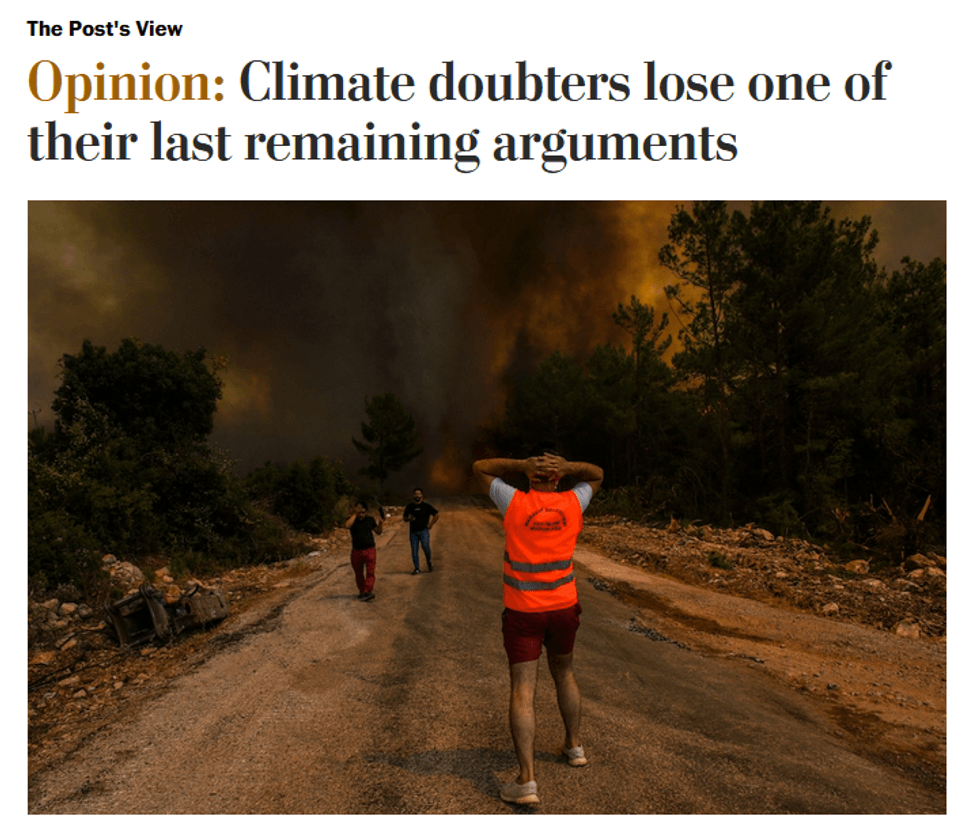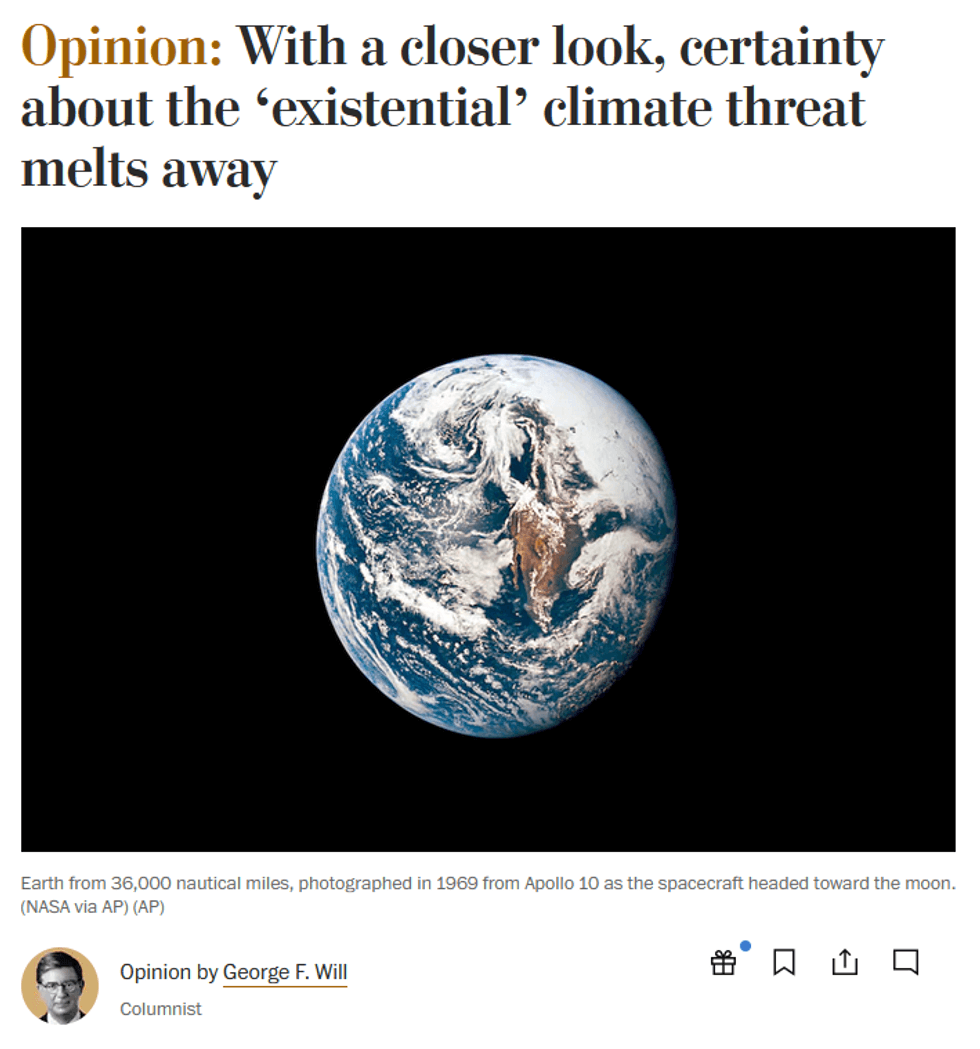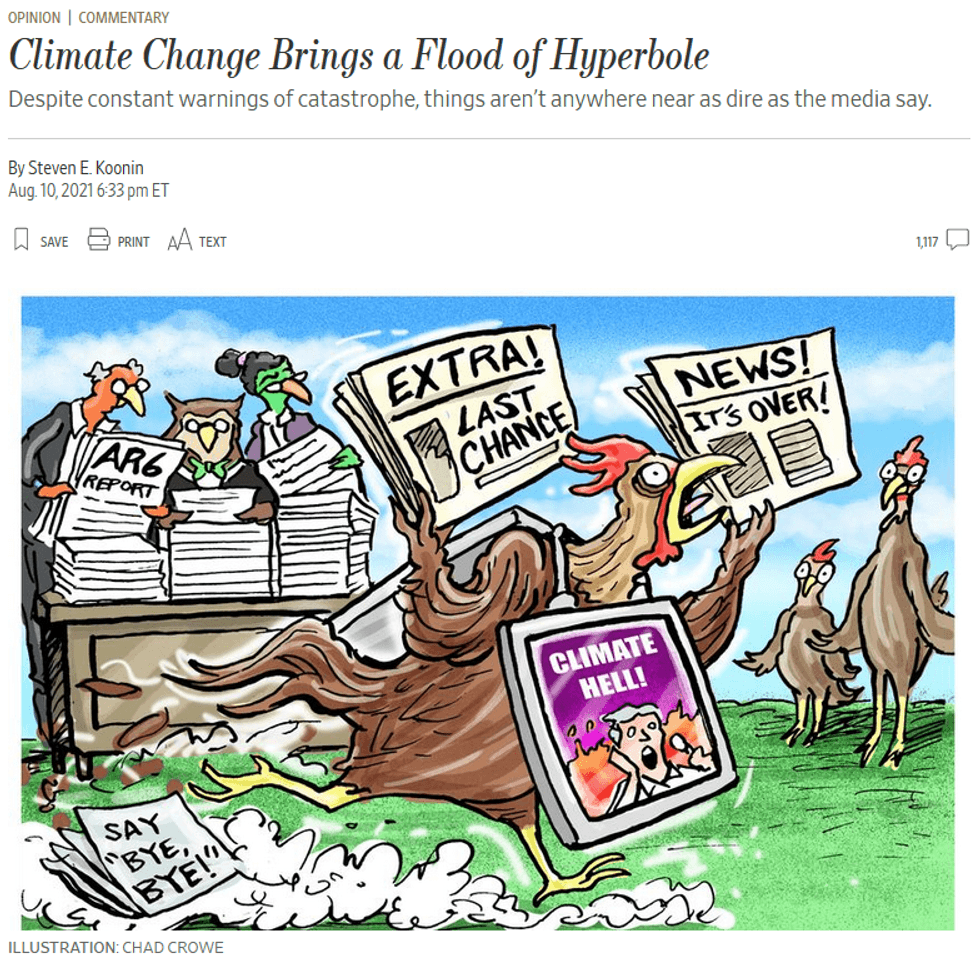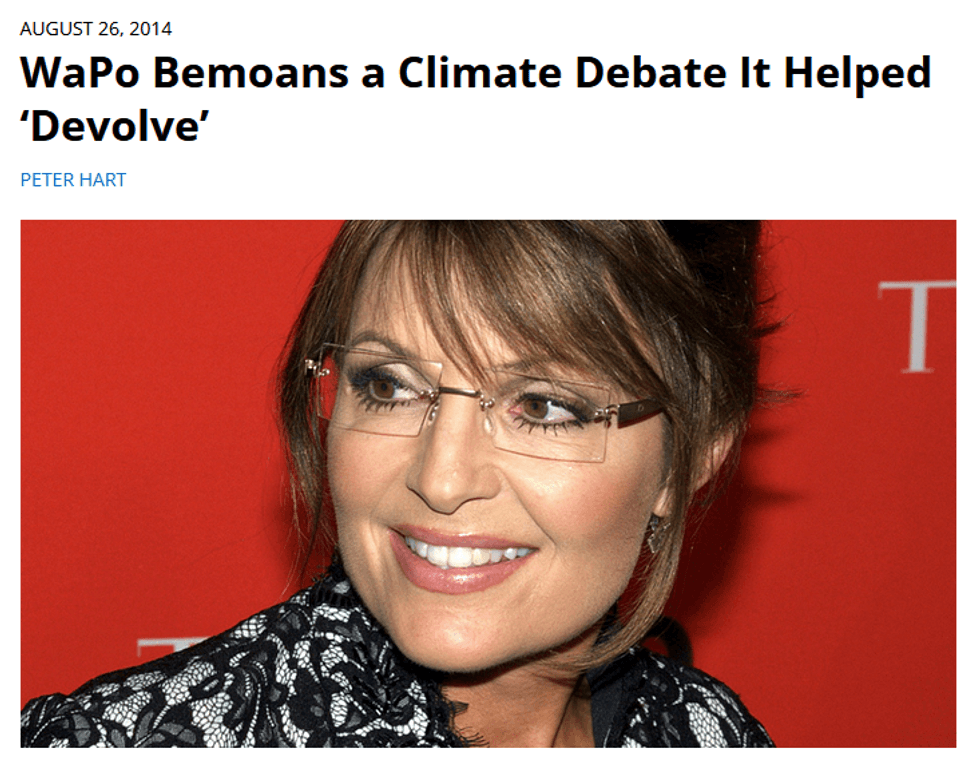
A climate activist with Stop the Money Pipeline holds a sign during a rally in midtown Manhattan on April 17, 2021. (Photo: Erik McGregor/LightRocket via Getty Images)
To donate by check, phone, or other method, see our More Ways to Give page.

A climate activist with Stop the Money Pipeline holds a sign during a rally in midtown Manhattan on April 17, 2021. (Photo: Erik McGregor/LightRocket via Getty Images)
Upon the release of the latest dire report from the UN Intergovernmental Panel on Climate Change (8/9/21), the Washington Post (8/10/21) published a strongly worded editorial under the headline, "Climate Doubters Lose One of Their Last Remaining Arguments."
In it, the editorial board argued that those who say we shouldn't "force economic disruption" because warming "might not be as bad as some fear" have lost "one of their last remaining arguments." The IPCC report demonstrates that "experts are more certain than ever that dire consequences are coming," the board noted, "ruling out the benign warming scenarios doubters insisted were still possible," and concluding that governments must "eliminate net greenhouse gas emissions by mid-century" to avoid the worst outcomes.

The Washington Post (8/10/21) editorializes that "experts are more certain than ever that dire consequences are coming" from climate change--but still allows its pundits to argue for inaction on the basis of uncertainty.
It's a clear and forceful statement, reflecting the global scientific consensus that the reality of the climate crisis can no longer be denied, and immediate, dramatic action must be taken.
So why does the Post continue to publish columns that promote that debunked denialist argument?

Not to worry, says George Will (Washington Post, 8/11/21)--sea levels "have been rising for 20,000 years," and the climate has been changing for "4.5 billion years."
The day after the editorial, longtime Post columnist George Will (8/11/21) purported to cast doubt on the IPCC report and its conclusions ("With a Closer Look, Certainty About the 'Existential' Climate Threat Melts Away"), using variously misleading, nonsensical and factually incorrect arguments from the latest darling of climate deniers, Steve Koonin.
Koonin, former BP chief scientist and undersecretary for science in Barack Obama's Energy Department, featured in another recent climate denialist Post column (10/12/21), a guest essay by former Indiana Gov. Mitch Daniels. Daniels presented Koonin as the truth-teller (with his service in the Obama administration making him "impeccably credentialed" politically) being attacked by "anti-intellectual" critics who offer only "ad hominem epithets" against him. (In fact, his critics offer endless debunkings of his "facts.")
Koonin isn't a "denier," Daniels explained: "Koonin stipulates firmly that Earth's climate is changing and becoming warmer, and that human influence is playing a role." But, Daniels continued, Koonin
uses government and academic reports' own data to challenge the scientific "consensus"--about rising sea levels, droughts, extreme weather--now repeated endlessly and uncritically.
In other words, now that denying climate change has lost any last shred of credibility, its proponents have largely abandoned it in favor of the new denialism, which says that climate change may be happening, but it's no big deal. The policy conclusion, conveniently, is the same: We don't need to make any drastic changes, like curbing fossil fuels.

Steven Koonin (Wall Street Journal, 8/10/21) writes, "Refreshingly, the [IPCC] report deems its highest-emissions scenarios of the future unlikely"--but doesn't note that's because the IPCC thinks it's unlikely that nations will follow the advice of people like Steven Koonin.
Observers have labeled this pivot by fossil fuel companies and their supporters "climate delay," which, among other things, falsely tries to paint new technologies, such as carbon capture, as more than sufficient to save us while they increase oil and gas production.
Koonin is a leading voice of the new climate denialism, and his recent book on the subject, Unsettled, has become the movement's Bible. But his arguments have been so thoroughly debunked by actual experts in the scientific and journalistic communities that other major news outlets haven't given his views a platform. That is, except for the notoriously right-wing opinion pages of the Wall Street Journal, where the editorial board approvingly cited Koonin to dismiss the IPCC report (8/9/21) and gave Koonin himself a column the next day to do the same (8/10/21), and Fox News, where he's found a sympathetic ear in Tucker Carlson (6/6/21, 6/21/21).
This is the company the Post finds itself in as it repeatedly publishes Koonin's misinformation. In fact, yet another right-wing Post columnist, Marc Thiessen (5/14/21), has highlighted "climate facts" from the "Obama scientist," approvingly repeating Koonin's argument that "the idea that we can stop climate change...is delusional," and that "adaptation is the only choice we have." (Again, debunked.)
What's more, in the past two months the opinion section has featured two other columns advocating climate inaction: a contribution by regular columnist Henry Olsen (9/22/21) arguing against big climate action (too "painful") in favor of the "more realistic approach" of focusing on technology, and a guest op-ed by a lawyer for energy companies (8/15/21) arguing against the SEC's recent proposal to make companies disclose their climate risks.

The Washington Post has a history (FAIR.org, 8/26/14) of bemoaning how the "national debate on climate change has devolved" (8/25/14) while presenting the likes of Sarah Palin (12/9/09) as climate experts.
Unfortunately, the Post opinion pages have a poor track record when it comes to climate. Will has been using his prominent Post column--which is also syndicated in smaller papers across the country--to spew climate disinformation since at least 1992 (FAIR.org, 5/1/07), while Post editors ignore or defend his debunked cherry-picking (FAIR.org, 2/25/09).
For years, the paper also paid former Reagan/Bush operative Ed Rogers for a regular column, allowing him to publish pieces downplaying climate change while failing to disclose that his lobbying firm counted Chevron as one of its biggest clients (FAIR.org, 4/23/15).
In fact, if this whole spectacle--of the Post editorial board announcing on one hand that climate change is a real crisis that must be urgently addressed, while on the other hand regularly publishing columns denying that scientific consensus--sounds strangely familiar, it's because it has happened before--in 2014 (FAIR.org, 8/26/14).
Yes, seven years ago the Post editorial board (8/25/14) made a big show of arguing that the "national debate on climate change has devolved" while "scientists' warnings have become more dire." It continued the argument the next day (8/26/14) by telling readers that political leaders "remain divided on the need to curb greenhouse emissions," which is simply "mind-boggling" to "mainstream scientists."
Yet at the same time, editorial page editor Fred Hiatt flatly refused to stop giving a platform to climate deniers (Media Matters, 8/26/14): "I'm more inclined to take op-eds that challenge our editorials than just kind of join the chorus."
Perhaps this should all come as little surprise, coming from Hiatt, a journalist who criticized presidential candidate Bernie Sanders' climate plan as "utter unseriousness" based on the opinions of an oil company CEO (FAIR.org, 2/24/20).
But it's one thing to publish contrarians in your paper; it's another to publish misinformation. It is well past time for the Post opinion section to stop offering a platform to the new climate denialism.
Ask Washington Post editorial page editor Fred Hiatt why, if "experts are more certain than ever that dire consequences are coming" from climate change, his section continues to feature arguments for inaction based on uncertainty.
Trump and Musk are on an unconstitutional rampage, aiming for virtually every corner of the federal government. These two right-wing billionaires are targeting nurses, scientists, teachers, daycare providers, judges, veterans, air traffic controllers, and nuclear safety inspectors. No one is safe. The food stamps program, Social Security, Medicare, and Medicaid are next. It’s an unprecedented disaster and a five-alarm fire, but there will be a reckoning. The people did not vote for this. The American people do not want this dystopian hellscape that hides behind claims of “efficiency.” Still, in reality, it is all a giveaway to corporate interests and the libertarian dreams of far-right oligarchs like Musk. Common Dreams is playing a vital role by reporting day and night on this orgy of corruption and greed, as well as what everyday people can do to organize and fight back. As a people-powered nonprofit news outlet, we cover issues the corporate media never will, but we can only continue with our readers’ support. |
Upon the release of the latest dire report from the UN Intergovernmental Panel on Climate Change (8/9/21), the Washington Post (8/10/21) published a strongly worded editorial under the headline, "Climate Doubters Lose One of Their Last Remaining Arguments."
In it, the editorial board argued that those who say we shouldn't "force economic disruption" because warming "might not be as bad as some fear" have lost "one of their last remaining arguments." The IPCC report demonstrates that "experts are more certain than ever that dire consequences are coming," the board noted, "ruling out the benign warming scenarios doubters insisted were still possible," and concluding that governments must "eliminate net greenhouse gas emissions by mid-century" to avoid the worst outcomes.

The Washington Post (8/10/21) editorializes that "experts are more certain than ever that dire consequences are coming" from climate change--but still allows its pundits to argue for inaction on the basis of uncertainty.
It's a clear and forceful statement, reflecting the global scientific consensus that the reality of the climate crisis can no longer be denied, and immediate, dramatic action must be taken.
So why does the Post continue to publish columns that promote that debunked denialist argument?

Not to worry, says George Will (Washington Post, 8/11/21)--sea levels "have been rising for 20,000 years," and the climate has been changing for "4.5 billion years."
The day after the editorial, longtime Post columnist George Will (8/11/21) purported to cast doubt on the IPCC report and its conclusions ("With a Closer Look, Certainty About the 'Existential' Climate Threat Melts Away"), using variously misleading, nonsensical and factually incorrect arguments from the latest darling of climate deniers, Steve Koonin.
Koonin, former BP chief scientist and undersecretary for science in Barack Obama's Energy Department, featured in another recent climate denialist Post column (10/12/21), a guest essay by former Indiana Gov. Mitch Daniels. Daniels presented Koonin as the truth-teller (with his service in the Obama administration making him "impeccably credentialed" politically) being attacked by "anti-intellectual" critics who offer only "ad hominem epithets" against him. (In fact, his critics offer endless debunkings of his "facts.")
Koonin isn't a "denier," Daniels explained: "Koonin stipulates firmly that Earth's climate is changing and becoming warmer, and that human influence is playing a role." But, Daniels continued, Koonin
uses government and academic reports' own data to challenge the scientific "consensus"--about rising sea levels, droughts, extreme weather--now repeated endlessly and uncritically.
In other words, now that denying climate change has lost any last shred of credibility, its proponents have largely abandoned it in favor of the new denialism, which says that climate change may be happening, but it's no big deal. The policy conclusion, conveniently, is the same: We don't need to make any drastic changes, like curbing fossil fuels.

Steven Koonin (Wall Street Journal, 8/10/21) writes, "Refreshingly, the [IPCC] report deems its highest-emissions scenarios of the future unlikely"--but doesn't note that's because the IPCC thinks it's unlikely that nations will follow the advice of people like Steven Koonin.
Observers have labeled this pivot by fossil fuel companies and their supporters "climate delay," which, among other things, falsely tries to paint new technologies, such as carbon capture, as more than sufficient to save us while they increase oil and gas production.
Koonin is a leading voice of the new climate denialism, and his recent book on the subject, Unsettled, has become the movement's Bible. But his arguments have been so thoroughly debunked by actual experts in the scientific and journalistic communities that other major news outlets haven't given his views a platform. That is, except for the notoriously right-wing opinion pages of the Wall Street Journal, where the editorial board approvingly cited Koonin to dismiss the IPCC report (8/9/21) and gave Koonin himself a column the next day to do the same (8/10/21), and Fox News, where he's found a sympathetic ear in Tucker Carlson (6/6/21, 6/21/21).
This is the company the Post finds itself in as it repeatedly publishes Koonin's misinformation. In fact, yet another right-wing Post columnist, Marc Thiessen (5/14/21), has highlighted "climate facts" from the "Obama scientist," approvingly repeating Koonin's argument that "the idea that we can stop climate change...is delusional," and that "adaptation is the only choice we have." (Again, debunked.)
What's more, in the past two months the opinion section has featured two other columns advocating climate inaction: a contribution by regular columnist Henry Olsen (9/22/21) arguing against big climate action (too "painful") in favor of the "more realistic approach" of focusing on technology, and a guest op-ed by a lawyer for energy companies (8/15/21) arguing against the SEC's recent proposal to make companies disclose their climate risks.

The Washington Post has a history (FAIR.org, 8/26/14) of bemoaning how the "national debate on climate change has devolved" (8/25/14) while presenting the likes of Sarah Palin (12/9/09) as climate experts.
Unfortunately, the Post opinion pages have a poor track record when it comes to climate. Will has been using his prominent Post column--which is also syndicated in smaller papers across the country--to spew climate disinformation since at least 1992 (FAIR.org, 5/1/07), while Post editors ignore or defend his debunked cherry-picking (FAIR.org, 2/25/09).
For years, the paper also paid former Reagan/Bush operative Ed Rogers for a regular column, allowing him to publish pieces downplaying climate change while failing to disclose that his lobbying firm counted Chevron as one of its biggest clients (FAIR.org, 4/23/15).
In fact, if this whole spectacle--of the Post editorial board announcing on one hand that climate change is a real crisis that must be urgently addressed, while on the other hand regularly publishing columns denying that scientific consensus--sounds strangely familiar, it's because it has happened before--in 2014 (FAIR.org, 8/26/14).
Yes, seven years ago the Post editorial board (8/25/14) made a big show of arguing that the "national debate on climate change has devolved" while "scientists' warnings have become more dire." It continued the argument the next day (8/26/14) by telling readers that political leaders "remain divided on the need to curb greenhouse emissions," which is simply "mind-boggling" to "mainstream scientists."
Yet at the same time, editorial page editor Fred Hiatt flatly refused to stop giving a platform to climate deniers (Media Matters, 8/26/14): "I'm more inclined to take op-eds that challenge our editorials than just kind of join the chorus."
Perhaps this should all come as little surprise, coming from Hiatt, a journalist who criticized presidential candidate Bernie Sanders' climate plan as "utter unseriousness" based on the opinions of an oil company CEO (FAIR.org, 2/24/20).
But it's one thing to publish contrarians in your paper; it's another to publish misinformation. It is well past time for the Post opinion section to stop offering a platform to the new climate denialism.
Ask Washington Post editorial page editor Fred Hiatt why, if "experts are more certain than ever that dire consequences are coming" from climate change, his section continues to feature arguments for inaction based on uncertainty.
Upon the release of the latest dire report from the UN Intergovernmental Panel on Climate Change (8/9/21), the Washington Post (8/10/21) published a strongly worded editorial under the headline, "Climate Doubters Lose One of Their Last Remaining Arguments."
In it, the editorial board argued that those who say we shouldn't "force economic disruption" because warming "might not be as bad as some fear" have lost "one of their last remaining arguments." The IPCC report demonstrates that "experts are more certain than ever that dire consequences are coming," the board noted, "ruling out the benign warming scenarios doubters insisted were still possible," and concluding that governments must "eliminate net greenhouse gas emissions by mid-century" to avoid the worst outcomes.

The Washington Post (8/10/21) editorializes that "experts are more certain than ever that dire consequences are coming" from climate change--but still allows its pundits to argue for inaction on the basis of uncertainty.
It's a clear and forceful statement, reflecting the global scientific consensus that the reality of the climate crisis can no longer be denied, and immediate, dramatic action must be taken.
So why does the Post continue to publish columns that promote that debunked denialist argument?

Not to worry, says George Will (Washington Post, 8/11/21)--sea levels "have been rising for 20,000 years," and the climate has been changing for "4.5 billion years."
The day after the editorial, longtime Post columnist George Will (8/11/21) purported to cast doubt on the IPCC report and its conclusions ("With a Closer Look, Certainty About the 'Existential' Climate Threat Melts Away"), using variously misleading, nonsensical and factually incorrect arguments from the latest darling of climate deniers, Steve Koonin.
Koonin, former BP chief scientist and undersecretary for science in Barack Obama's Energy Department, featured in another recent climate denialist Post column (10/12/21), a guest essay by former Indiana Gov. Mitch Daniels. Daniels presented Koonin as the truth-teller (with his service in the Obama administration making him "impeccably credentialed" politically) being attacked by "anti-intellectual" critics who offer only "ad hominem epithets" against him. (In fact, his critics offer endless debunkings of his "facts.")
Koonin isn't a "denier," Daniels explained: "Koonin stipulates firmly that Earth's climate is changing and becoming warmer, and that human influence is playing a role." But, Daniels continued, Koonin
uses government and academic reports' own data to challenge the scientific "consensus"--about rising sea levels, droughts, extreme weather--now repeated endlessly and uncritically.
In other words, now that denying climate change has lost any last shred of credibility, its proponents have largely abandoned it in favor of the new denialism, which says that climate change may be happening, but it's no big deal. The policy conclusion, conveniently, is the same: We don't need to make any drastic changes, like curbing fossil fuels.

Steven Koonin (Wall Street Journal, 8/10/21) writes, "Refreshingly, the [IPCC] report deems its highest-emissions scenarios of the future unlikely"--but doesn't note that's because the IPCC thinks it's unlikely that nations will follow the advice of people like Steven Koonin.
Observers have labeled this pivot by fossil fuel companies and their supporters "climate delay," which, among other things, falsely tries to paint new technologies, such as carbon capture, as more than sufficient to save us while they increase oil and gas production.
Koonin is a leading voice of the new climate denialism, and his recent book on the subject, Unsettled, has become the movement's Bible. But his arguments have been so thoroughly debunked by actual experts in the scientific and journalistic communities that other major news outlets haven't given his views a platform. That is, except for the notoriously right-wing opinion pages of the Wall Street Journal, where the editorial board approvingly cited Koonin to dismiss the IPCC report (8/9/21) and gave Koonin himself a column the next day to do the same (8/10/21), and Fox News, where he's found a sympathetic ear in Tucker Carlson (6/6/21, 6/21/21).
This is the company the Post finds itself in as it repeatedly publishes Koonin's misinformation. In fact, yet another right-wing Post columnist, Marc Thiessen (5/14/21), has highlighted "climate facts" from the "Obama scientist," approvingly repeating Koonin's argument that "the idea that we can stop climate change...is delusional," and that "adaptation is the only choice we have." (Again, debunked.)
What's more, in the past two months the opinion section has featured two other columns advocating climate inaction: a contribution by regular columnist Henry Olsen (9/22/21) arguing against big climate action (too "painful") in favor of the "more realistic approach" of focusing on technology, and a guest op-ed by a lawyer for energy companies (8/15/21) arguing against the SEC's recent proposal to make companies disclose their climate risks.

The Washington Post has a history (FAIR.org, 8/26/14) of bemoaning how the "national debate on climate change has devolved" (8/25/14) while presenting the likes of Sarah Palin (12/9/09) as climate experts.
Unfortunately, the Post opinion pages have a poor track record when it comes to climate. Will has been using his prominent Post column--which is also syndicated in smaller papers across the country--to spew climate disinformation since at least 1992 (FAIR.org, 5/1/07), while Post editors ignore or defend his debunked cherry-picking (FAIR.org, 2/25/09).
For years, the paper also paid former Reagan/Bush operative Ed Rogers for a regular column, allowing him to publish pieces downplaying climate change while failing to disclose that his lobbying firm counted Chevron as one of its biggest clients (FAIR.org, 4/23/15).
In fact, if this whole spectacle--of the Post editorial board announcing on one hand that climate change is a real crisis that must be urgently addressed, while on the other hand regularly publishing columns denying that scientific consensus--sounds strangely familiar, it's because it has happened before--in 2014 (FAIR.org, 8/26/14).
Yes, seven years ago the Post editorial board (8/25/14) made a big show of arguing that the "national debate on climate change has devolved" while "scientists' warnings have become more dire." It continued the argument the next day (8/26/14) by telling readers that political leaders "remain divided on the need to curb greenhouse emissions," which is simply "mind-boggling" to "mainstream scientists."
Yet at the same time, editorial page editor Fred Hiatt flatly refused to stop giving a platform to climate deniers (Media Matters, 8/26/14): "I'm more inclined to take op-eds that challenge our editorials than just kind of join the chorus."
Perhaps this should all come as little surprise, coming from Hiatt, a journalist who criticized presidential candidate Bernie Sanders' climate plan as "utter unseriousness" based on the opinions of an oil company CEO (FAIR.org, 2/24/20).
But it's one thing to publish contrarians in your paper; it's another to publish misinformation. It is well past time for the Post opinion section to stop offering a platform to the new climate denialism.
Ask Washington Post editorial page editor Fred Hiatt why, if "experts are more certain than ever that dire consequences are coming" from climate change, his section continues to feature arguments for inaction based on uncertainty.